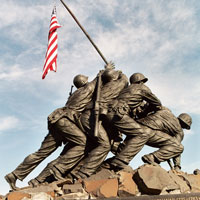History: Raising the Flag on Iwo Jima

Five Marines and a Navy Corpsman raised the U.S. flag on Mount Suribachi in a photo that won the Pulitzer Prize. Uploaded by wallpaperesphotography.com.
Five Marines and a Navy corpsman raised the American flag on the worthless island of Iwo Jima near the end of World War II, and the image resonated with a home front that clamored for good news from the Pacific campaign.
Iwo Jima isn’t much more than a volcanic rock sticking up in the Pacific, 760 miles from Tokyo. The volcano is Mount Suribachi, only 528 feet tall – but when everything around is flat, its altitude is exaggerated by its strategic importance. The Japanese had radar installations there that warned of incoming air raids, giving antiaircraft units time notice of attacks and improving their efficiency. So the U.S. Command felt it necessary to capture this island, a decision that resulted in American victory, but a horrible loss of life on both sides. For the Japanese, there was nowhere to retreat – of its 22,000 soldiers on the island, all but 216 were killed in action or committed ritual suicide. America lost 6,800 men, mostly Marines.
The iconic photo didn’t celebrate the end of the campaign, but rather the capture of Mount Suribachi and the southern end of the island. The battle wasn’t completed for another month. The photo was taken by Joe Rosenthal, and it won the Pulitzer Prize for photography that year. The image was used to create the Marine Corps Memorial outside Arlington National Cemetery.
A sobering fact: Of the six men included in the photograph, three did not survive the Battle of Iwo Jima.


Awesome photo…chokes me up every time I see it. My dad wasn’t there, but he was a radio operator on troop transport plans in the Army Air Corp in Europe. Even when he had Alzheimers and couldn’t remember my name, he could still remember Morse code.